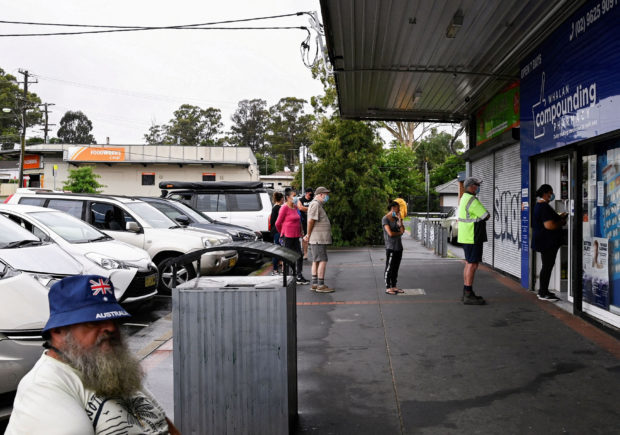
FILE PHOTO: Customers queue outside a Western Sydney chemist to purchase Rapid Antigen Test kits in the wake of the coronavirus disease (COVID-19) pandemic in Sydney, Australia, January 5, 2022. REUTERS/Jaimi Joy
SYDNEY — Australia reported one of its highest daily death tolls from the novel coronavirus on Thursday while hospital admissions hovered near record levels, as authorities struggle to get ahead of highly contagious Omicron variants.
The BA.4/5 variants are good at evading immune protection from vaccination or prior infection and have been driving a surge of new infections globally.
Australia is reporting the highest daily numbers since the first Omicron wave earlier this year, with 89 deaths from the coronavirus on Thursday and 90 on Wednesday. Just over 55,600 new cases were recorded on Thursday, the highest since May 18.
Prime Minister Anthony Albanese said state leaders and federal health officials have not recommended making masks mandatory in indoor venues, despite calls by some doctors to do so.
Australia avoided the high death tolls seen in other countries during the first waves of the pandemic thanks largely to high levels of public compliance with tough social distancing restrictions.
But there is little public appetite for a return to such measures to defeat the latest surge in infections and Albanese has resisted pressure from some health experts to impose mask mandates.
“It’s no good having a mandate unless it’s enforced,” Albanese told ABC Radio.
He said health officials also had to take into account the effects of tough restrictions on mental health.
The latest Omicron wave is pushing the number of people with COVID-19 in Australian hospitals close to the peak hit in January. About 5,350 patients are in hospitals, and several states are battling record admissions.
Authorities have urged businesses to let staff work from home and recommended people get booster shots urgently, with only about 71% of the eligible population having received their boosters. About 95% of people above 16 have had two doses.
Since the pandemic began, Australia has reported about 9 million COVID-19 cases and 10,968 deaths.
RELATED STORIES
Australians urged to work from home as winter Omicron wave swamps hospitals
Australia expands fourth COVID-19 dose rollout amid fresh Omicron threat